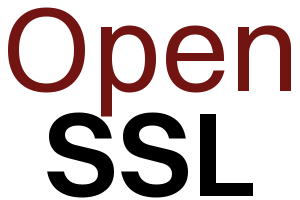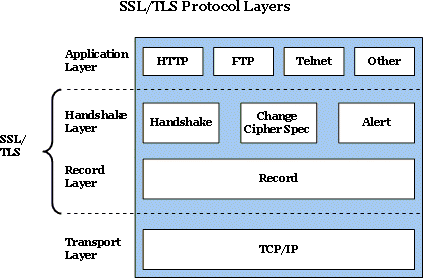Some people have offered to provide OpenSSL binary distributions for selected operating systems. The condition to get a link here is that the link is stable and can provide continued support for OpenSSL for a while.
Note: many Linux distributions come with pre-compiled OpenSSL packages. Those are already well-known among the users of said distributions, and will therefore not be mentioned here. If you are such a user, we ask you to get in touch with your distributor first. This service is primarily for operating systems where there are no pre-compiled OpenSSL packages.

Important Disclaimer:The listing of these third party products does not imply any endorsement by the OpenSSL project, and these organizations are not affiliated in any way with OpenSSL other than by the reference to their independent web sites here. In particular any donations or payments to any of these organizations will not be known to, seen by, or in any way benefit the OpenSSL project.
Use these OpenSSL derived products at your own risk; these products have not been evaluated or tested by the OpenSSL project.
OpenSSL for OSX 0.9.5a is a third party application that provides additional functionality to OS X system and enjoys a popularity among Mac users. However, instead of installing it by dragging its icon to the Application folder, uninstalling OpenSSL for OSX 0.9.5a may need you to do more than a simple drag-and-drop to the Trash. Tested on my mac book with macOS High Sierra (10.13.6). Here is my output of built-in OpenSSL: $ /usr/bin/openssl version -a LibreSSL 2.2.7 built on: date not available platform: information not.
| Product | Description | URL |
|---|---|---|
| OpenSSL for Windows | Works with MSVC++, Builder 3/4/5, and MinGW. Comes in form of self-install executables. | https://slproweb.com/products/Win32OpenSSL.html |
| OpenSSL for Windows | Pre-compiled Win32/64 libraries without external dependencies to the Microsoft Visual Studio Runtime DLLs, except for the system provided msvcrt.dll. | https://indy.fulgan.com/SSL/ |
| OpenSSL for Windows | Reproducible 1.1.x builds with latest MinGW-w64/GCC, 32/64-bit, static/dynamic libs and executable. | https://bintray.com/vszakats/generic/openssl |
| OpenSSL for Solaris | Versions for Solaris 2.5 - 11 SPARC and X86 | http://www.unixpackages.com/ |
| OpensSSL for Windows, Linux, OSX, Android | Pre-compiled packages at conan.io package manager: Windows x86/x86_64 (Visual Studio 10, 12, 14, 15) Linux x86/x86_64 (gcc 4.6, 4.8, 4.9, 5, 6, 7) OSx (Apple clang). Cross-building ready recipe: Linux ARM, Android. | https://www.conan.io https://bintray.com/conan-community/conan/OpenSSL%3Aconan |
| OpenSSL for Windows | Pre-compiled Win32/64 1.0.2, 1.1.0 and 1.1.1 libraries without external dependencies, primarily built for François Piette's Internet Component Suite (ICS) for Embarcadero (Borland) Delphi and C++ development tools, but may be used for any Windows applications. The OpenSSL DLLs and EXE files are digitally code signed 'Open Source Developer, François PIETTE', so applications can self verify them for corruption. | http://wiki.overbyte.eu/wiki/index.php/ICS_Download |
| OpenSSL for Windows | Pre-compiled 64-bit (x64) and 32-bit (x86) 1.1.1 executables and libraries for Microsoft Windows Operating Systems with a dependency on the Microsoft Visual Studio 2015-2019 runtime. The distribution may be used standalone or integrated into any Windows application. The distribution's EXE and DLL files are digitally signed 'FireDaemon Technologies Limited'. | https://kb.firedaemon.com/support/solutions/articles/4000121705 |
Some third parties provide OpenSSL compatible engines. As for the binaries above the following disclaimer applies:
Important Disclaimer:The listing of these third party products does not imply any endorsement by the OpenSSL project, and these organizations are not affiliated in any way with OpenSSL other than by the reference to their independent web sites here. In particular any donations or payments to any of these organizations will not be known to, seen by, or in any way benefit the OpenSSL project.

| Product | Description | URL |
|---|---|---|
| Intel® QuickAssist Technology engine | Intel® QuickAssist Technology (http://www.intel.com/content/www/us/en/embedded/technology/quickassist/overview.html) provides acceleration for a number of cryptographic algorithms. QAT_engine adds support for Intel® QuickAssist Technology to OpenSSL-1.1.0 via the ENGINE framework. The definitive list of algorithms exposed into OpenSSL (a subset of those supported in the device) is defined on the associated github page. | https://github.com/01org/QAT_Engine |
| ATECCX08 engine | Support for the Atmel ATECC508A (http://www.atmel.com/devices/ATECC508A.aspx) hardware to provide secure key storage, ECC cryptographic calculations for the ECC NIST P-256 curve, and FIPS certified hardware Random Number Generator. | https://github.com/AtmelCSO/cryptoauth-openssl-engine |
| GOST engine | A reference implementation of the Russian GOST crypto algorithms for OpenSSL. The presence of this engine also enables the built-in OpenSSL support for GOST TLS ciphersuites. (Note: this engine is for OpenSSL version 1.1.0 and above. Previous versions of OpenSSL used a built-in GOST engine) | https://github.com/gost-engine/engine |
| ISARA Radiate Solution Suite OpenSSL Connector | Commercially available engine and source code patch for OpenSSL 1.0.2 branch. The ISARA Radiate OpenSSL Connector lets you implement OpenSSL using quantum safe algorithms. ISARA Radiate (https://www.isara.com/isara-radiate/) gives you the cryptographic building blocks to create applications that will resist attacks by quantum computers. | https://www.isara.com/openssl/1/ |
| BEE2EVP engine | Implements the Belarusian national cryptography: symmetric and public-key encryption, MAC, AEAD, hashing, digital signature. Encapsulates the Bee2 core cryptographic library into OpenSSL using the EVP interface. | https://github.com/bcrypto/bee2evp |
About the App
- App name: openssl
- App description: OpenSSL SSL/TLS cryptography library
- App website: https://openssl.org
Install the App
- Press
Command+Spaceand type Terminal and press enter/return key. - Run in Terminal app:
ruby -e '$(curl -fsSL https://raw.githubusercontent.com/Homebrew/install/master/install)' < /dev/null 2> /dev/null
and press enter/return key.
If the screen prompts you to enter a password, please enter your Mac's user password to continue. When you type the password, it won't be displayed on screen, but the system would accept it. So just type your password and press ENTER/RETURN key. Then wait for the command to finish. - Run:
brew install openssl
How To Install Openssl For Mac
Done! You can now use openssl.
Openssl Library For Mac
Similar Software for Mac

